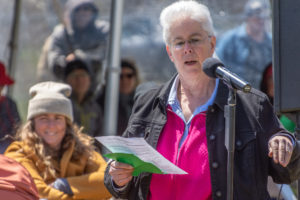TRURO — Truro’s housing crisis took center stage at Saturday’s town meeting, which featured chilly temperatures, gusty winds, and heated debate over Article 50.
That petitioned article would have changed the planning board from an elected one to one appointed by the select board. It required a two-thirds majority, which it barely missed.
Voters approved the expansion of a child-care voucher program and a Proposition 2½ override to fund four more firefighter-paramedics to the town’s struggling fire dept.
The meeting adjourned just before 2 p.m. when a quorum was lost, but it resumed the next day to close out the last items on the warrant.

Voters approved Article 7, a $212,500 expenditure that will expand a child-care voucher program to all children through age four who can’t be accommodated at Truro Central School’s preschool. The original voucher program started with a petitioned article from Raphael Richter at last year’s town meeting; it offered parents $7,500 vouchers to enroll two- and three-year-olds in child care.
“That pilot was a success, with a large uptake of families using the program,” said Richter. “As a reminder, child care in Mass. is the most expensive in the nation.” Article 7 expanded the existing program to include children younger than two as well as three- and four-year-olds.
Planning Board in the Hot Seat
Shortly after the vote on Article 7, charter review committee (CRC) member Chris Lucy asked to take Article 50 out of order before the chill sent people home and dissolved the quorum.
Richter, the originator of the article, urged voters to support the change. “Folks, the situation is broken,” he said. “Supporters of this article have not just appeared out of nowhere or with a personal vendetta. We are active and concerned community members who have watched with frustration and sadness as important initiatives have been delayed and derailed, while our friends and colleagues are forced out of the community at a steady clip.”
The planning board’s votes, he said, have reflected a “clear pattern of obstruction and, at times, outright opposition to housing solutions being brought forward.”
“The median home price in this town is over a million dollars,” said state Sen. Julian Cyr. “I can’t afford to buy a home in this town — and I’m your state senator. I’m a hometown kid.”
Brian Boyle, the CRC chair, said that a 4-3 majority of his committee had concluded that the charter should remain unchanged. Amy Wolff, a voter, said the planning board was being “scapegoated” and that keeping the board elected “brings balance and greater diversity of ideas and thoughts to the table.” Jack Riemer, a planning board member, argued that doing away with these elected positions amounted to “giving up our democratic right.”
Richter said that few candidates step up to run for any elected board. He argued that contested select board races were the venue for “the best discussions about the important issues facing our community. By making this change, you are strengthening the power and meaning of your vote.”
Tensions flared when select board vice chair Kristen Reed pinpointed Articles 43 through 46 as evidence of the planning board’s “silo-ed” approach to drafting zoning bylaws. Those articles were postponed indefinitely.

“The select board couldn’t support those articles because they aren’t ready, because the boards don’t work together,” Reed said. “Effectively, it’s lip service. There’s just no honesty in it. I’m sorry —”
“Point of order!” planning board chair Anne Greenbaum called out. “I will not be called a liar at this town meeting.”
“I’m rather loath to get up here,” said Ellery Althaus, a planning board member. He said he was the person who had drafted Article 46, a bylaw on duplexes with problems that derailed it for this town meeting. He had scraped it together in just 15 minutes before a planning board meeting, he said.
“I thought the whole group would have multiple meetings forming bylaws that might help save this town,” Althaus said. “Instead, it was me in that silo we’ve all talked about. Perhaps it’s time to allow the select board to appoint people who are more qualified than myself to do this.”
In the end, 130 voted for the charter change; 77 voted against it — 63 percent in favor, short of the two-thirds needed.
Dozens of voters scooped up their bags and moved toward the parking lot to escape the cold. As voters flipped back 50 pages in their warrant booklets to Article 8, Richter sprang to his feet and moved for reconsideration of Article 50.
The group had by then dwindled from 207 voters to 155. The motion to reconsider, which required only a simple majority, passed 91 to 64.
Before Article 50 came to its second vote, however, some voters had hustled back to the ballfield. There were now 171 voters: 113 voted for the charter change, and 58 voted against it. That was 66.08 percent in favor — barely shy of two-thirds. If one “no” vote had been a “yes,” the tally would have been 114 to 57 — exactly two-thirds in favor.
Richter and Cyr said that coming so close was still a win. “A strong majority in town agree we need to take a different course on housing, continue the momentum, and bring that to the Walsh property,” said Cyr. The Walsh property is a 70-acre parcel of undeveloped land that Truro purchased in 2019.
As for Greenbaum, she’s “looking forward to turning the page,” she told the Independent.
Firefighters and More
Voters passed Article 10, a Proposition 2½ override that will permanently bump up the town’s levy limit by $355,765. The extra funding will allow the town to add four full-time firefighter-paramedics and move toward three-person crews.
“We almost experienced a catastrophic failure of this fire department,” said Chief Tim Collins. “Sending two people to a fire is not sufficient. To respond to a building fire, 25 tasks need to be completed within eight minutes. Three people can accomplish those tasks 25 percent more quickly than two people.”
Article 10 still needs to pass at the annual town election on May 10.
A 13-article bundle of Community Preservation Act expenditures was approved in one fell swoop. Among them: Truro will pitch in $100,000 to help support an affordable housing project at the former Cape Cod 5 bank headquarters in Orleans; the High Head conservation area will get 1½ miles of trails and six benches; and the Highland House Museum will acquire a collection of Wampanoag art and artifacts and build a wetu, a traditional house.



